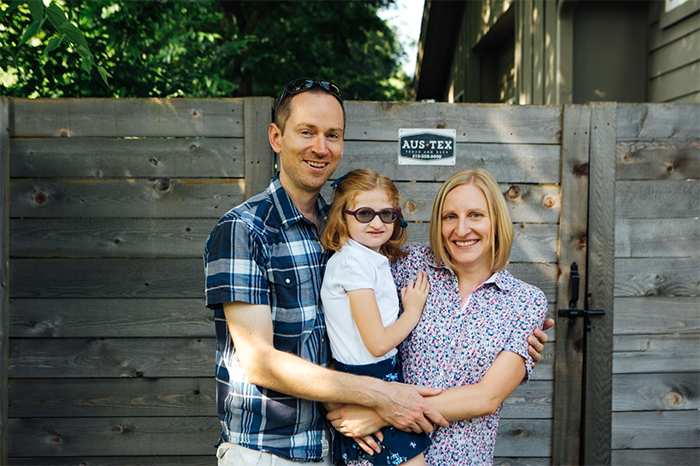Finding your Community after a Diagnosis, by Lily Brown
Five years ago, during my first week at a new job, I received a phone call from my daughter's genetic counselor. "Is this a good time to talk?" I knew that this phone call could bring an end to a three-year search. Yet I naively assumed that any news of significance would only be released in the presence of both parents. So, I made my way from the open space to a private phone booth.
That's when I received the confirmation that my daughter has Cohen syndrome. The long-awaited answer provided little of the relief I had expected to feel: "1,000 identified in the world"… "there isn't much information"… "she's still your daughter."
I only remember fragments of the following days and weeks. Very little sleep. A hurricane whose destructive winds and dark clouds matched my state of mind. Skipping lunch to avoid cafeteria small talk. A manager's awkward "don't forget to add it to your time off" when I let them know that our first pediatrician appointment post-diagnosis was running long. The shocked silence when my husband and I called our respective siblings, informing them that they, too, might be carriers. It all added up to a crushing sense of loneliness.
This would have been a prime time to lean on my support system had I maintained one. I moved to the US as a "Volunteer for International Experience" in my early twenties. As an immigrant, I had a small and fragile social network. Friendships morphed and faded, as expected, with each life event: marriage, motherhood, interstate relocations. My network became even smaller when I started swapping neighborhood playdates for individual speech, physical, and occupational therapy appointments. Faced with the demands of caregiving, I felt like I just didn't have the capacity, physical or emotional, to keep up with my circles, let alone join new ones.
Even close friends and family could not fully understand the profound effect of the syndrome, just as I could not relate to their more typical parenting journey. The isolation set in as I realized that many of my go-to confidants suddenly no longer had the experience to advise me. My own husband's ever-resilient and positive attitude puzzled me. How could he be so optimistic under such a dark cloud of uncertainty?
In that respect, we weren't alone: ours was a common and well-documented experience. Although I didn't know it then, my husband and I were both going through the stages of adaptation, just not at the same pace. As I frantically blended surviving and searching, I was fortunate to find my local Parent to Parent program. I was matched with a volunteer peer supporter who offered a calming presence and a listening ear. I remember receiving a picture from her: her family, all smiles. She didn't tell me that things were going to be okay. Instead, she showed it to me, and her simple gesture gave me hope for the future. Later, I met the mother of a young adult with Cohen syndrome at a Parent to Parent conference. There was an instant bond: like a second family. As I let go of my fear of a "label" and started sharing the diagnosis, I started building my community. My daughter's school director connected me with another family who had a daughter with Cohen syndrome, who, in turn, knew other families in the area. We all met at a playground, and I learned that playdates could be stress-free and inclusive.
Once overwhelming, an online group dedicated to the syndrome became a source of inspiration. Support from other parents around the world gave me the confidence to help my daughter develop hard-earned skills: speaking, riding an adapted bike, decoding words. Not only that: those parents I have never met in person celebrated those successes with me. Where others see typical childhood milestones, those of us who have "walked the walk" rejoice in each victory, big or small. It's a long journey to an unknown destination, but each step forward makes a difference.
Parenting a child with special needs is not for the faint of heart. Day in, day out, there is no time off in caregiving. My newfound community helped me survive the first few months after the genetic diagnosis. It helped me navigate a pandemic that cut off my family's supports and services. Because adaptation is a process, those connections are as much a lifeline now as they were then.
Better yet, as our community grows and organizes, more parents like me go from coping to creating change. Together, we are now connecting researchers throughout the world and raising funds to support studies to find treatments. If your child has received a genetic diagnosis, no matter how rare, know that you are not alone. When you are ready, the resources below can help you to process the news and your feelings as you find your community.
- Learn more about the stages of adaptation: https://www.parentcompanion.org/article/the-4-stages-of-adaptation-stage-1-surviving/family%20life%20and%20support
- Find Parent to Parent support near you: https://www.p2pusa.org/parents/
- Find disease-specific support organizations: https://www.diseaseinfosearch.org/

